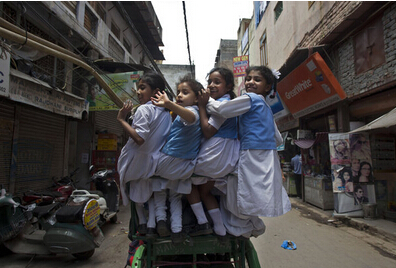(单词翻译:单击)
NEW DELHI — Is that her mother or her maid?
新德里——那是她的母亲还是她的女佣?
That was the question a little girl asked out loud about the woman who had accompanied her schoolmate to a birthday party. In any segment of the Indian urban population, the visual distinction between mothers and maids is sacred. The maids look impoverished and servile, and in a room filled with the master class they are encouraged to achieve invisibility.
一个小女孩大声问出这个问题,她指的是一个陪同她同学参加生日派对的女性。在印度所有的城市人口中,母亲和女佣之间的视觉区别都是神圣不可侵犯的。女佣看上去贫穷、卑躬屈膝,社会鼓励她们在上等人云集的房间里保持“隐形”。

The target of the question at the party was of modest means, but she was with the affluent mothers — like an equal, which she was. Her child was a beneficiary of the Right to Free and Compulsory Education Act, which took effect in 2010. The act requires that all private schools in India, except those run by and for minority communities, reserve 25 percent of their seats for children in the neighborhood who are from 6 to 14 years of age and socially or financially disadvantaged. The schools must also provide this education free.
在那个派对上,小女孩所说的人看上去不富裕,但她和有钱人家的母亲待在一起——像是与她们地位平等,事实的确也是这样。她的孩子是《免费义务教育法案》(Right to Free and Compulsory Education Act)的受益者。该法案于2010年生效,规定印度所有的私立学校,除了少数族裔学校之外,都要保留25%的招生名额,给社区里6至14岁的、在社会或经济上处于弱势的孩子。而且这些学校必须免费提供教育。
In affluent parts of Indian society, such students are known as “E.W.S.” (Economically Weaker Section), an abbreviation that is spoken in hushed tones.
在印度社会的富裕阶层,这样的学生被称为“经济弱势学生”(Economically Weaker Section),人们通常以压低的声音说出它的缩写EWS。
Long before the act came into force, there was opposition to it. The gracious reasoning of the middle class was that the poor, once uprooted from their islands of poverty, would be made to feel small. The more practical reasoning was that schools would raise fees for paying students to make up for the loss of revenue, or increase enrollments, thereby diminishing the quality of education. Also, there was a fear that their children might contract diseases from the poor.
在该法案生效很久之前,有人提出反对。中产阶层的大道理是,穷人一旦被从贫穷的岛屿中连根拔起,他们就会自觉渺小。更现实的理由是,学校会提高付费学生的收费标准,来弥补收入上的损失,要不就增加入学人数,而这会降低教育质量。此外,他们还担心自家孩子可能会从穷人那里传染上疾病。
In a society where the primal instinct of the classes is to collide rather than to integrate, the education act is creating situations that nobody knows how to resolve. When a school in New Delhi announced a pool party for its first grade, the affluent parents decided to donate swimwear to the poor students. But on the day of the party, only the poor children turned up. The other children were kept away by their parents because they did not wish their children to share the pool with the poor.
这个社会中,不同阶级的原始本能是碰撞,而不是融合,而该教育法案所导致的一些状况,也没有人知道该如何解决。当新德里一所学校宣布,将为一年级学生召开一个游泳池派对时,富裕家庭的父母决定为贫困学生捐献泳装。但是在举行派对那天,只有穷人家的孩子到了场。其他学生的父母不让他们来,因为不希望自己的孩子与穷人分享游泳池。
Across the country, many private schools have chosen not to take students from the “weaker sections.” Many that do so have different classrooms or schedules for them even though the law forbids such segregation.
在全国范围内,许多私立学校都选择不从“弱势群体”中招生。很多招录了贫困学生的学校,则给他们安排了不同的教室或课程表,即使法律禁止这种隔离做法。
“The act is here to stay, but there is no regulation,” said Sunil Batra, director of education at Shikshantar, a highly regarded school in Gurgaon, near Delhi, which has enthusiastically complied with the act. “What happens to schools that don’t comply? There is no answer. State and central governments are yet to determine the methods by which the act will be regulated.”
“该法案会实施下去,但相关的规定却是空白,”一所知名学校的教务主任苏尼尔·巴特拉(Sunil Batra)说,该校位于德里附近的古尔冈,已经在积极遵守这项法案。“不遵守这项法案会怎么样?没有答案。邦政府和中央政府尚未决定采取哪些方法来执行这个法案。”
One school in the National Capital Region — the area around New Delhi — does not have a single student from the disadvantaged section.
在国家首都辖区,即新德里周围的区域,有所学校连一个来自弱势群体的学生都没有。
“There is no demand,” said the school’s owner, who asked not to be identified. “The poor have not applied — not one. And frankly, we are not chasing them, either. Maybe there is not enough awareness. Maybe they are too scared to walk into an expensive school.”
“没有这种需求,”不愿具名的学校所有者说。“没有穷人申请入学,一个都没有。坦率地说,我们也没有争取他们的申请。这或许是由于没有足够强烈的意识。或许是因为他们太害怕,不敢走进一所富人学校。”
The largest owner of schools in India is the government, and its demand that the private sector take on the burden of educating the poor is, even though couched in the high purpose of abolishing barriers between the rich and the poor, an admission that the quality of its own schools is irredeemably pathetic.
在印度,最大的学校所有者是政府,但它却让私立学校承担起教育穷人的负担,尽管宣称这是为了消除贫富壁垒的高尚目标,但也相当于承认了公立学校的教学质量奇差无比。
“A majority of India’s private schools are just marginally better than the government schools,” said Ram Chand, who runs a private school in the capital region. “So what’s the government’s logic?”
“大多数印度私立学校,也只是比公立学校略强一点,”拉姆·昌德(Ram Chand)说,他是首都地区一所私立学校的负责人。“那政府的逻辑是什么?”
But he agreed that the poor who attend the best private schools have benefited immensely. Two years ago, at his daughter’s birthday party, he too witnessed an indigent child arrive with her mother, and both of them had a miserable time. The next year, the mother dropped her daughter at the gates and refused to enter the house.
但他认为,进入了一流私立学校的穷人从中受益匪浅。两年前,他也亲眼目睹了一个贫困孩子和她母亲前来参加自己女儿的生日派对,结果这对母女在派对上都很郁闷。第二年,那位母亲把女儿送到了他家门口,就不肯再进来。
“But the girl was not afraid of the rich anymore — she had a great time,” Mr. Chand said. “She was transformed.”
“但女孩却不再惧怕富人了——她玩得很开心,”昌德说。“她被彻底改变了。”


